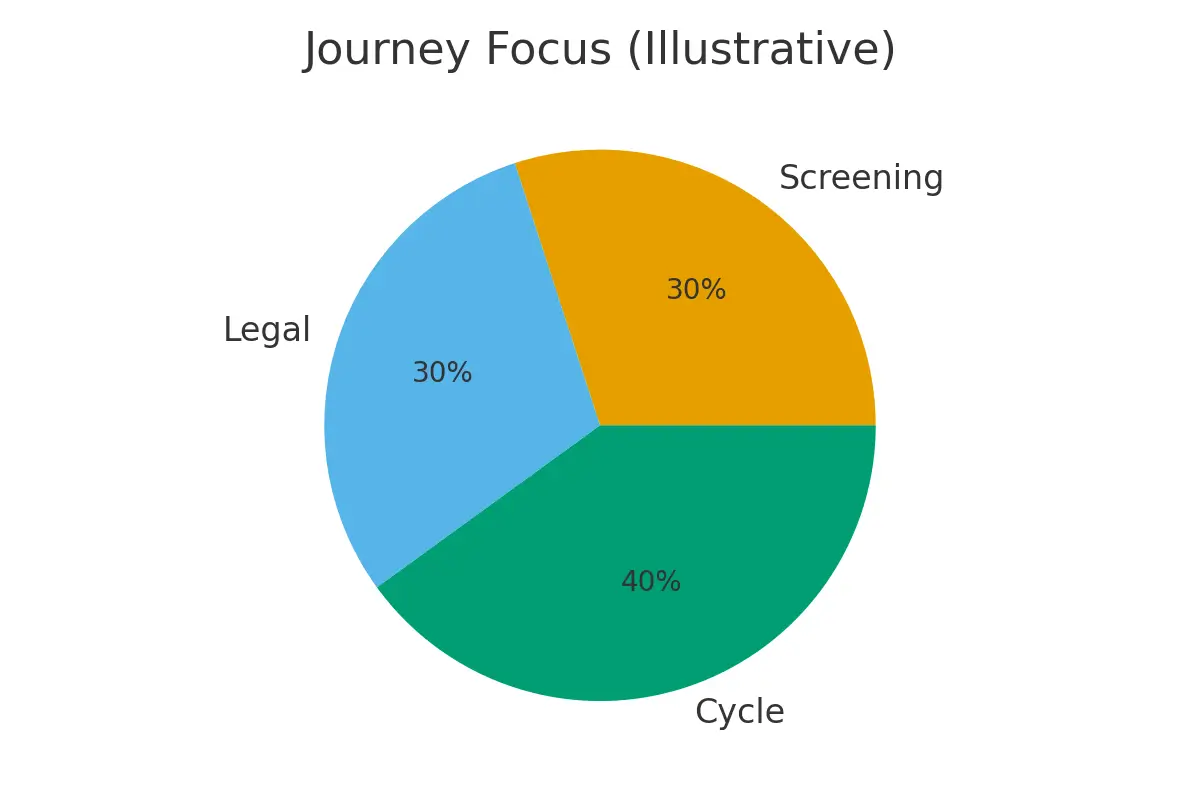
This article explains egg donors vs embryo donation vs sperm donors — big picture within the Donor Options (Eggs vs Embryos vs Sperm) pathway. We focus on practical choices that influence outcomes, budgets, and timelines—so you can move forward with clarity and confidence.
What It Is
Egg Donors vs Embryo Donation vs Sperm Donors — Big Picture in plain English: how each option works, where it fits in the fertility journey, what it changes biologically and emotionally, and how upstream decisions affect downstream results—from success rates to cost planning to future family-building flexibility.
Who It Helps
This pathway supports individuals and couples who are exploring third-party reproduction because of:
- Age-related egg or sperm decline
- Low ovarian reserve or poor response in prior cycles
- Genetic conditions where using own gametes increases risk
- Failed IVF cycles, recurrent pregnancy loss, or severe male-factor infertility
- Single parents by choice or same-sex couples planning family formation
It also clarifies when a different path may be a better fit, based on history, labs, imaging, genetics, and prior treatment responses.
Step-by-Step
A simple sequence with timing checkpoints to protect embryo quality and reduce stress:
- Clarify medical indication — why eggs, embryos, or sperm donation is being considered.
- Review medical factors — AMH, semen analysis, antral follicle count, genetics, partner factors.
- Choose donor path — egg donor, embryo donation, sperm donor, or combination.
- Match and screening — donor profiles, medical clearance, infectious-disease testing, legal steps.
- Cycle planning — syncing timelines, medications, retrieval/transfer dates.
- Embryology plan — fertilization method, number of embryos, PGT-A decisions.
- Transfer and follow-up — lining checks, progesterone timing, pregnancy testing.
Each checkpoint is designed to reduce last-minute problems and protect embryos.
Pros & Cons
Egg Donation
Pros: Highest embryo quality potential, more control over genetics, strong success rates.
Cons: Higher cost, more logistics, waiting time for a match.
Embryo Donation
Pros: Most cost-effective, fastest timeline, minimal medical steps.
Cons: No genetic link for either parent, limited choice, variable information about donors.
Sperm Donation
Pros: Most affordable, simplest medically, widely available options.
Cons: No genetic link for the male partner, may require additional steps if using IUI/IVF.
Costs & Logistics
A realistic breakdown of financial and administrative steps:
- Donor agency or bank fees
- Medical cycle costs (stimulation, monitoring, retrieval, transfer)
- Legal contracts
- Donor screening and labs
- Genetic testing
- Medication costs
- Embryology procedures (ICSI, freezing, PGT-A)
Simple tools—checklists, payment timelines, and prior-authorization reminders—help prevent surprise bills.
What Improves Outcomes
Actions that consistently change results:
- Choosing donors with strong ovarian reserve and proven sperm quality
- Ensuring laboratory conditions (timing, freezing, thawing) are optimized
- Allowing enough time for lining preparation instead of rushing to transfer
- Completing genetics counseling early
- Clear communication with the clinic to avoid cycle delays
And actions that rarely improve outcomes:
- Excessive supplements
- Over-monitoring without medical indication
- Making decisions based only on donor photos rather than health factors
Case Study
A couple faced repeated IVF failure due to low egg yield and abnormal embryos. Through structured counseling, they compared egg donation, embryo donation, and donor sperm. After reviewing medical indicators and their timeline goals, they selected a proven egg donor and planned a single-embryo transfer. With steady communication and clear thresholds for each stage, they moved from uncertainty to a confident, personalized plan with healthy embryos available for future use.
Mistakes to Avoid
- Choosing a donor without reviewing medical and genetic information
- Underestimating legal and contract timelines
- Rushing to transfer without optimizing lining or progesterone timing
- Ignoring emotional readiness for donor-assisted reproduction
- Not planning for sibling goals early (especially relevant for egg donor cycles)
FAQs
Q. How do I decide between egg donation and embryo donation?
Ans. Egg donation maintains a genetic link for one parent and offers more control, while embryo donation is faster and more affordable but has no genetic link for either parent.
Q. Are donor-conceived pregnancy rates higher than using my own eggs or sperm?
Ans. Often yes—egg donor cycles and high-quality donor sperm can significantly improve outcomes when age or previous results suggest low success using one’s own gametes.
Q. Is PGT-A recommended for donor embryos?
Ans. Not always. Because donors are typically young with strong gamete quality, the benefit varies; it’s a case-by-case decision.
Q. How long does matching with a donor usually take?
Ans. Sperm donor selection may take days, egg donors weeks to months, and embryo donation varies widely depending on availability and clinic policies.
Q. Can I use donor eggs or sperm if I have specific genetic conditions?
Ans. Yes—donor options are often recommended to reduce transmission risk, but genetics counseling helps map the safest path.
Next Steps
- Free 15-min nurse consult
- Upload your labs
- Get a personalized cost breakdown for your case
Related Links

Dr. Kulsoom Baloch
Dr. Kulsoom Baloch is a dedicated donor coordinator at Egg Donors, leveraging her extensive background in medicine and public health. She holds an MBBS from Ziauddin University, Pakistan, and an MPH from Hofstra University, New York. With three years of clinical experience at prominent hospitals in Karachi, Pakistan, Dr. Baloch has honed her skills in patient care and medical research.





